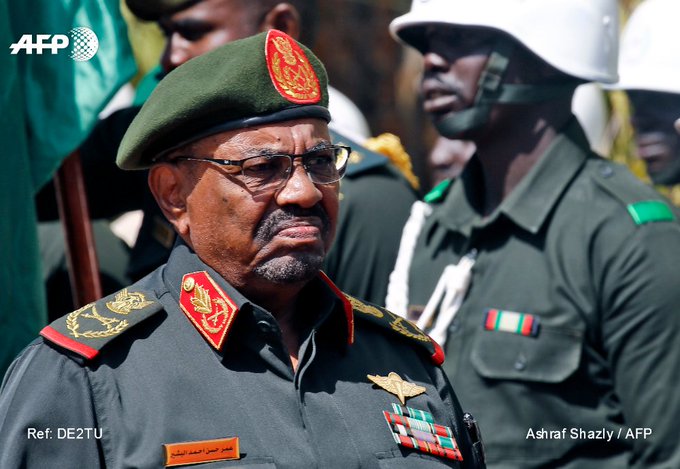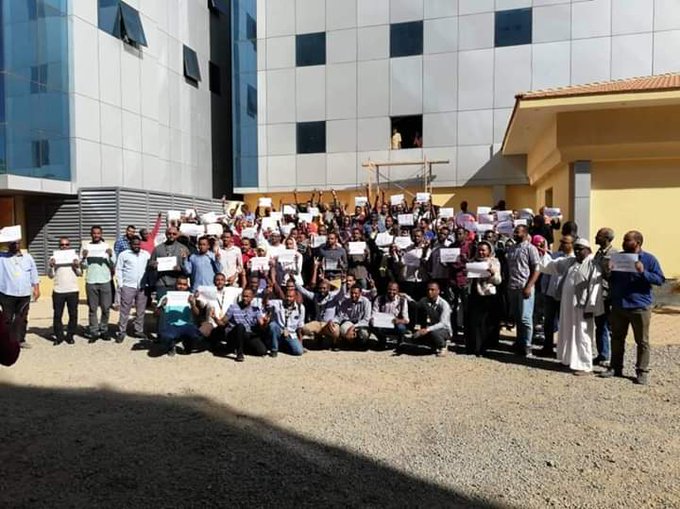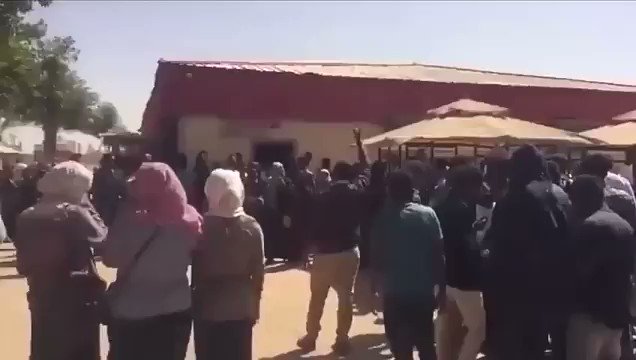Sudan protest updates: December 2018 – February 1, 2019
New premier sworn in
Following the dissolution of government on Friday, in addition to declaration of state of emergency, president Nashir appointed Mohamed Tahir Eila as the new prime minister.
Eila , who is the former governor of the agricultural state of Jazeera was sworn in on Sunday, at a ceremony, according to an AFP photographer.
“Today, a new chapter begins in Sudan’s history,” Bashir, dressed in a military uniform, said at the ceremony.
Defence Minister General Awad Ibnouf was sworn in as the first vice president after his predecessor Bakri Hassan Saleh was sacked by Bashir.


Bashir also swore in 16 army officers and two officers from the National Intelligence and Security Service dressed in military uniforms as new governors for the country’s 18 provinces.
“This chapter needs special people like you to lead… in order to guarantee security and stability in the country.”

Bashir is expected to announce an entire new cabinet as he pushes on with sweeping top level changes in the face of nationwide protests that have rocked his rule.
Protesters defy state of emergency
Meanwhile, protesters continued to defy the state of emergency, holding demonstrations in Omdurman city, and the Khartoum districts of Burri and Shambat.
“We want to give the president a message that the state of emergency will not deter us,” said Sawsan Bashir who participated in the Omdurman rally.
“Our aim is to overthrow this regime and we will do it.”
Riot police swiftly confronted protesters in Omdurman and Burri with tear gas, witnesses said.
Protest organisers have vowed to continue with daily rallies, accusing Bashir and his officials of economic mismanagement that has led to soaring food prices and shortage of foreign currency.
February 23, 2019: President names defense minister as first veep
Sudan’s Defence Minister Awad Mohamed Ahmed Ibn Auf was appointed first vice president and will remain the defence minister, the Sudanese presidency said on Saturday.
President Omar al-Bashir declared a one-year nationwide state of emergency on Friday and set up a caretaker administration but retained his defence, foreign and justice ministers.The inside story of Bashir’s plan to quell anti-govt protests
Protesters frustrated with economic hardship have demonstrated for more than two months calling for an end to Bashir’s 30-year-old rule.
Bashir also replaced on Friday the governors of every Sudanese state with military officials.
Ibn Auf, who previously served as the head of military intelligence, earlier this month became the second of several top officials to strike a conciliatory tone towards the protests, saying that young people caught up in the recent turmoil had “reasonable ambition”.1989 – 2019: Highlights of Bashir’s three-decades in charge
February 22, 2019: President declares 12-month state of emergency
Sudanese President Omar Al-Bashir has declared a 12-month state of emergency across the country. The declaration was made in an address to the nation at 8pm local time on Friday (February 22).
The move is aimed at quelling spreading anti-government protests calling for him to leave office.
Meanwhile, protesters continued their rallies in the capital Khartoum after the close of the Friday congregational prayers, Jum’ah.
Bashir has stressed that he will only leave office if polls are held but the relentless protesters have also vowed to continue till he leaves.
Security agencies have had a hard time controlling some of the protests. Routine reports of tear gas and discharge of live bullets have led to deaths and injuries amid widespread arrest of political opponents and journalists.View image on Twitter


#BREAKING Sudan’s President Omar al-Bashir declares a year-long state of emergency after anti-government protests12210:13 PM – Feb 22, 2019240 people are talking about thisTwitter Ads info and privacy
February 21, 2019: Telecom giants undertake sit-ins
Reports indicate that employees of MTN and Zain have staged sit-in protests at their offices in the country.
The action is allied with ongoing protests that have rocked the government with calls for president Al-Bashir to quit after three decades in charge of the country.
MTN is one of three telecom outfits operating in the country. Government has since December 2018 ordered a restriction on access to especially social media platforms.
But it continues to be one of the main sources of information on the anti-government action. Facebook and Twitter have been crucial in spreading information about ongoings across the country.View image on Twitter


A peaceful sit-in today by employees at MTN – one of the big three telecom companies in Sudan that have restricted access to social media platforms since the 20th of December.35710:59 AM – Feb 21, 2019250 people are talking about thisTwitter Ads info and privacy
February 19, 2019: Students
Varsity students in Sudan were shown protesting against the continued stay in office of President Omar Al-Bashir. They join a growing public call for the three-decades old leader to go.
Protests have led to the closure of a number of universities across the country as government security apparatus tries to get a grip on the nationwide action.
Despite being called by a Sudanese Professional Association, the country’s main opposition and other rights groups locally have joined in encouraging citizens to keep up the protests.News Analysis: Bashir vs. Protesters – What next for Sudan?


Students in Sudan protesting today.
Many universities remain closed as protests calling for an end to the Al-Bashir regime continue across the Country.158:14 PM – Feb 19, 2019See Samira Sawlani’s other TweetsTwitter Ads info and privacy
Journalists – local and international, have been caught in the middle of the protests. Foreign reporters have been deported or ordered out over their coverage whiles local journalists have been arrested and allegedly tortured.
Rolls of daily and weekly newspapers have also been confiscated. A number of varsity professors in the capital Khartoum were recently arrested for attempting to stage a protest.
The government has routinely come out to report of deaths resulting from clashes. In the recent past, a fruit seller died of tear gas inhalation whiles a police was also stoned to death.
Human rights groups have disputed official government figures of deaths, putting the figure at above 40 – twice as much as the government tally.
February 17, 2019: Fruit seller dies over tear gas inhalation
A Sudanese fruit seller died Sunday in a hospital in Khartoum after inhaling tear gas fired by riot police during protests, according to his relatives and a committee of doctors linked to the anti-government protest movement.
“He was taken to the hospital but the doctors could not save him, he died from tear gas inhalation,” said a doctor who requested anonymity for security reasons.
A crowd of protesters gathered in Khartoum in the Bahari district (north) chanting “Freedom, Peace and Justice”, the main slogan of the protest, but soon faced riot police who fired tear gas, witnesses have reported.
February 15, 2019: Police pelted to death by protesters
A Sudanese policeman has died from his wounds after protesters threw stones at a police vehicle passing close to demonstrations in the capital Khartoum, a police spokesman said on Friday.
The vehicle was passing the area by chance late on Thursday, the spokesman said, adding that a number of suspects had been arrested.
The case brings the official death toll during protests that have spread since Dec. 19 across Sudan to 32, including three security personnel. An opposition-linked doctors’ syndicate said last week that 57 people had been killed in the protests.
“The vehicle was pelted with stones, and they were police returning from training and had no link to the dispersal of the unrest,” said police spokesman Hashem Ali.
Security forces dispersed protests close to the presidential palace in Khartoum on Thursday, rounding up several dozen of them and driving them away in pick up trucks, witnesses said.
On Friday police fired teargas to disperse hundreds of people who protested after leaving a mosque in Omdurman, across the Nile from central Khartoum, witnesses said.
REUTERS
February 14, 2019: Zero retreat till Bashir is history, arrests in Khartoum
Organizers of anti-government demonstrations in Sudan have reiterated their determination to continue mobilizing people until they overthrow the regime, excluding any dialogue with Sudanese President Omar al-Bashir.
Driven by a deep economic crisis, Sudan has been shaken since December 19 by almost daily demonstrations triggered by the government’s decision to triple the price of bread and other essential commodities.
“The opposition forces are united behind the demands of the people. They are working in harmony to overthrow the regime, and to continue demonstrations or sit-ins,” Sara Najdullah, Secretary General,
Association of Sudanese Professionals said.¨Read our story here: Protest organisers vow to oust president Omar al-Bashir
Security forces fired teargas to disperse hundreds of protesters close to the Sudan’s presidential palace on Thursday, before plainclothes officers armed with plastic piping rounded up around 30 people, witnesses said.
Police then chased activists through side streets as smaller rallies broke out across downtown Khartoum.
Demonstrators chanted “Peaceful, peaceful against the thieves” and “Down, that’s it!” – their central demand for President Omar al-Bashir to step down.
The detained protesters, most of them young men and women, were driven away in pickup trucks, witnesses said. A police spokesman could not be reached for comment.
Union members, students, opposition activists and others, frustrated with economic hardships, have held near daily protests since Dec. 19, in the most sustained challenge to Bashir’s three decades in power.
The president and his ruling National Congress Party have shown no sign of bowing to those demands and have blamed the unrest on unnamed foreign powers. He and senior officials have used more conciliatory language in recent weeks, promising to release detained demonstrators.
But activists say hundreds remain in detention. An opposition-linked doctors’ syndicate said last week that 57 people have been killed in the protests. The government puts the death toll at 31, including two security personnel.
Security forces have used teargas, stun grenades and live ammunition to break up demonstrations.
The unrest has been fuelled by a deepening economic crisis marked by high inflation and shortages of bread, petrol and cash. The Sudanese pound fell to a record low on the black market on Thursday.
REUTERS
February 13, 2019: Sudan govt using hit-squad against protesters
The BBC is reporting about how the Sudanese government is employing special hit-squads to crackdown on anti-government protests that continue to spread across the country.
The BBC’s investigative wing, Africa Eye, pooled together videos shared by Sudanese caught in the protest whiles taking testimony of a victim of alleged state torture.
The BBC says it analyzed over 200 videos over the past weeks which showed low-level thugs under orders from the feared intelligence outfit, the NISS.
“Some of these protesters tell us about a secret and widely feared holding facility – The Fridge – where the cold is used as an instrument of torture,” the BBC report said.
President Omar Al-Bashir remains adamant about calls to step down. According to him only polls not protests will lead him out. Sudanese are expected to elect a president in 2020.

February 12, 2019: Professors arrested for planned protest
Security forces arrested 14 professors who were gathering to protest outside Khartoum University on Tuesday, witnesses said, as anti-government demonstrations neared the end of their eighth week.
Doctors also rallied outside state and private hospitals in Sudan’s capital and other cities against the rule of President Omar al-Bashir, witnesses added.
Union members, students, opposition activists and others, frustrated with economic hardships, have held near daily protests since Dec. 19, in the most sustained challenge to Bashir’s three decades in power.
Photos posted online on Tuesday showed people holding banners marked with “Freedom, justice and peace”, “No to torturing and killing protesters” and other slogans.
Rights groups say at least 45 people have been killed in the protests since they began on Dec. 19, while the government puts the death toll at 31.
Bashir has blamed the unrest on unnamed foreign powers and showed no signs of bowing to demands to quit. But he and some senior officials have adopted a more conciliatory tone in recent weeks and promised to free detained protesters.
REUTERS
